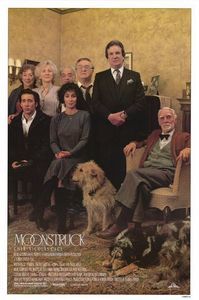 Norman Jewison’s 1987 film Moonstruck, a landmark romantic comedy, is positively bursting with insight on matters of love and marriage in the modern world. At its core, the movie makes two central assertions about the mysteries of the human heart. First, that love and happiness are dependent almost entirely on luck; and second, that men cheat on their wives because they fear death. The film’s grand finale considers both.
Norman Jewison’s 1987 film Moonstruck, a landmark romantic comedy, is positively bursting with insight on matters of love and marriage in the modern world. At its core, the movie makes two central assertions about the mysteries of the human heart. First, that love and happiness are dependent almost entirely on luck; and second, that men cheat on their wives because they fear death. The film’s grand finale considers both.
Of the two women who infer these twin theses, Loretta Castorini (Cher) has perhaps the more pressing issue: She has fallen in love with her fiancé’s estranged brother. Considering that the fiancé is Danny Aiello and his brother is Nicolas Cage, we can understand her dilemma. In vintage freak-out mode, Cage hurtles into Loretta’s life at the exact moment when she has no use for him, even as they are drawn to each other with a passion and immediacy neither saw coming.
The tragedy, the movie implies, is not that Loretta is cheating on her future husband, but rather that she has found the right man at the wrong time, with her boring fiancé as an innocent and unfortunate bystander. By agreeing to marry Aiello without quite loving him, Loretta gambled that her happiness died with her first husband. When Cage turns up and proves her wrong, she views the whole situation as a terrible inconvenience.
Meanwhile, there is another infidelity percolating through Moonstruck, conducted by Loretta’s father, Cosmo (Vincent Gardenia), and suspected all along by his wife, Rose (Olympia Dukakis). As a sign of the film’s maturity and intelligence, there is never a moment when Rose “catches” Cosmo with his mistress. She doesn’t need to. She has been married to this man for most of her life and knows when he is not telling her the whole truth. Her theory that men do this because they fear death is hardly consolation for her. After all, the only man in history who successfully avoided death was a bachelor.
In any event, what we finally get, in the movie’s great climactic showdown, is Rose’s plea for Cosmo to knock it off. Sitting across the breakfast table, surrounded by family, Rose musters the bravest face she can summon, looks Cosmo straight in the eye and says, “I want you to stop seeing her.” In a lesser movie, this would be a moment of high melodrama, with all the hysteria and mayhem that comes with it. Not here. Cosmo rises, slams the table, sits back down and responds simply, “Okay.”
The key to this tense exchange—and, in a way, to the whole movie—is to realize that Cosmo brings down his fist not in anger, but in guilt. It’s not just that he knows his philandering was wrong. It’s that he still truly and wholeheartedly loves his wife, and knows she is worthy of his faithfulness, just as she has deemed him worthy of hers. Their partnership might be depleted of its earlier passion, but not its responsibilities or mutual affection.
Loretta, at the other end of the marriage arc, shares both her father’s guilt and her mother’s weariness, and takes heed in Rose’s half-tongue-in-cheek advice about men, “When you love them they drive you crazy, because they know they can.” Rose and Cosmo married for love and have suffered the consequences ever since, but what Loretta comes to realize for herself is that sometimes marrying for love is worth it, if only because the alternatives—marrying without love or not marrying at all—are almost unbearable.
-Dan Seliber
The great scene, in full: